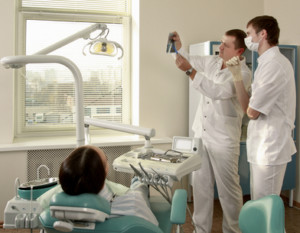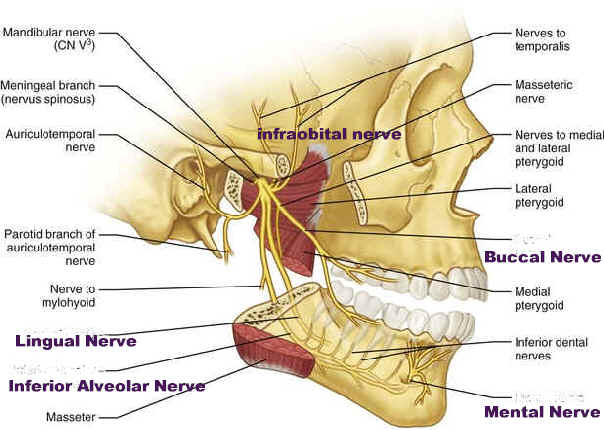Dental Surgery and Nerve Damage, and what can be done (with links to treatments)
Dental Nerve Damage – How it happens and what can be done for relief
During dental work and dental surgery, nerves may become damaged.*
Young woman with a dentist in a dental surgery. Healthcare, medicine.
The lingual nerve (located near the sides of the tongue) is a branch of the mandibular nerve (in the jaw), which is a branch of the trigeminal nerve (the nerve that brings sensation to the face). (See diagram below) The lingual nerve supplies sensory nerves to the tongue. Damage to this nerve results in pain or numbness within the tongue and along the mucous membrane on the tongue side of the teeth.
A lingual nerve injury can also be caused by the anesthetic injection.
Tooth extraction is also one of the leading causes of lingual nerve and inferior alveolar nerve (lower teeth) damage. It is usually at the third molars (wisdom teeth).
Other causes during Dental Surgery
Other causes of nerve damage during surgery include the scalpel, a bruise that occurs on the nerve, inflammation of the tissue around the nerve, or prolonged contact with rigid surgical equipment. In addition, prolonged stretching or compression of tissue surrounding a nerve hampers circulation and can deprive the nerve of nourishment.
These all can lead to nerve damage, which may be temporary or permanent.
In some cases the nerve damage will go away over time, as the injured portion of the nerve heals or the inflammation goes away. In other cases, the symptoms are permanent unless the nerve damage is repaired.
Dental Implant Surgery
Dental implant nerve damage is common. The reported incidence of such nerve injuries following dental implant procedures is anywhere from 0-44%.
Sensory impairment of the skin and lining of the mouth from the branches of the trigeminal nerve is possible with dental implant surgery.

(See Diagram Above) The most common nerves injured are the inferior alveolar nerve (IAN) and its mental branch, the lingual nerve, long buccal nerve, and the infraorbital nerve because of the anatomic location of these structures to the surgery.
Damage to the Trigeminal Nerve is also common.**
Neurosensory impairment may occur during all phases of dental implant surgery, including anesthetic administration, incisions, soft tissue being pulled back, surgical preparation for cutting of the bone, bone augmentation (bone made ready for implant), implant placement, suturing and/or soft tissue swelling after surgery.
In addition, during dental implant surgery, prolonged stretching or compression of tissue surrounding a nerve hampers circulation and can deprive the nerve of nourishment.
This nerve damage is also called Oral Dysesthesia
Symptoms of surgical nerve damage:
Symptoms include tingling or numbness in one area of the face, jaw or neck. It may resemble “pins and needles: It can result in pain, which is generally a severe burning pain.
The pain that comes from post-surgical nerve damage will be treated by medical doctors with pain medication even narcotics to cover up the symptoms.
Reference National Institute of Health – Persistent Pain after Dental Surgery
Reference: International Journal of Dentistry Pain Management for Nerve Injury following Dental Implant Surgery
Treatments for the Nerve Damage of Dental Surgery
You’ve probably read or heard about lots of different remedies for the symptoms of nerve damage (neuropathy). You just need to search on the internet under neuropathy to get pages and pages of remedies. The search will reveal many different viewpoints about what will help you get relief. I’ve talked to many people who have tried remedy after remedy.
There are many herbs that attempt to cover up the symptoms and there are many drugs that try to cover up the symptoms.
There are many different antioxidants and formulas that will bring some relief. I know the things that will help – essential fatty acids, vitamin c, combination of acetyl l-carnitine and alpha-lipoic acid – etc. etc.
You can go to Neuropathy Treatments to get the pros and cons of many of these.
Also – Nerve Damage from Surgery
The real cause of all these problems, however, is the unhealthy nerves. Healthy nerves aren’t painful, they aren’t numb, don’t burn, and aren’t all the other symptoms that you feel with nerve damage.
GET YOUR QUALITY OF LIFE BACK
What can you do:
Restoring Health to the Nerves:
We always recommend you take the approach of building health, and nerves are no different.
The Healthier your nerves are, the less the symptoms of nerve damage you will feel.
Nerves need to be healthy to function properly.
Pros: Healthy sensory nerves mean that they are not painful. Healthy nerves mean that they communicate and don’t send wrong signals such as burning, hot and cold, tingling when there is no reason for it. Healthy motor nerves mean that they relay messages from the brain to the muscle so that they move correctly without weakness.
The body needs specific nutrients (vitamins) to be able to build healthy nerves. Getting bioavailable special forms of B1 and B12, along with the other B Vitamins that activate them, will promote and support healthy nerves.
Cons: It may not give immediate relief (although sometimes it does) as the vitamins are working at a cellular level; it may take longer, but it does address the actual problem and builds healthy nerves.
Building Healthy Nerves: Find out what is needed to restore health to the nerves.
Natural Treatment & Building Healthy Nerves in your mouth
The body needs the correct tools to restore health and build healthy nerves. These tools are specific nutrition (vitamins).
What are they? Read on….
It has been known for some time that B1 (thiamine) is very effective. It is needed by the body to create healthy nerves.
Unfortunately, the oral intake of vitamin B1 does not greatly increase the levels of B1 in the bloodstream.
The reason for this is that Thiamine, like all of the B vitamins, is water-soluble. Thiamine cannot be stored in the body and is flushed out within 4 to 5 hours.
Additionally, it has been found that the symptoms are made worse by insufficient amounts of B12 in the body. Vitamin B12 supports the sheathing that protects nerve cells and has been shown in studies to promote the growth of healthy nerve cells.
In the past, it has been difficult to remedy the B12 deficiency. The reason for this is that while vitamin B12 is readily stored by the body, it is not readily absorbed by the body. For this reason, much larger amounts have been used in supplementation, but even large oral dosages have not been an adequate solution.
Keep reading. There is a solution.
A Remedy for this Problem:
You might have heard of the new type of vitamin B1 being produced, called Benfotiamine. It is a fat-soluble version of vitamin B1. What does this mean? It means this new form of vitamin B1 can be taken orally in large dosages, and it will not flush out of the body the way ordinary Thiamine (vitamin B1) does. This is due to the fact that this type of B1 will be delivered into the bloodstream, where it can travel to the cells and be used.
Also available is Methylcobalamine (called Methyl B12). This is the form of vitamin B12 that can be directly utilized by the body. When regular B12 is taken, the body has to convert it into Methyl B12 in the gut. Methyl B12 already comes in this useable form.
Where can I find these supplements?
RECOMMENDED: (This is where we have researched products and found one that we found will work for you)
We have been recommending this formula for 16 years. We have looked at other products that had similar ingredients but haven’t found one that has all the necessary ingredients.
The vitamins mentioned above to build healthy nerves are available together. The name of the product is RHP Nerve Support Formula
It contains both Benfotiamine and Methyl B12. The result is that the bloodstream levels of vitamin B1 and vitamin B12 can be greatly increased, providing the nutritional support needed by the body to rapidly and far more effectively to decrease or eliminate the symptoms of unhealthy nerves.
Both Benfotiamine and Methyl B12 have been shown to be non-toxic and without any side effects even in very high dosages.
Additionally, the formula has three other B vitamins and vitamin D3 in the exact proportion that work together to produce the best results. The formula has been found to be exactly what the body needs.
Why the other B vitamins in the formula?
B1 (thiamine) is dependent on the other B-complex vitamins. Absorption of B1 into the body requires adequate supplies of vitamin B6, B12 and B9 (folate). A deficiency in Vitamins B12 can increase loss of B1in the urine, and vitamin B6 also appears to help regulate distribution of thiamine throughout the body. B9 (folate) is also necessary to activate the absorption of B12. The body utilizes vitamin B2 to keep tissue healthy and to help accelerate the healing of injuries. B2 protects the nervous system.
In addition, the formula has Vitamin D. One of the functions of Vitamin D is the regulation of nervous system development and function.
It also has magnesium and alpha lipoic acid.
How do these vitamins support nerve health? ** Read about Healthy Nerves
Ready to Order the RHP Nerve Support Formula
**Studies
Support for Your Success:
We want to make sure that you get the results you are seeking. We have is a live support line. Our help is part of your purchase.
Recommended
We don’t just want you to buy a vitamin and hope it works. We want to make sure that you know how to take it and anything that might cause a slowdown in restoring nerve health.
Nerve Support can support the body’s ability to build healthy nerves by addressing the root of the problem at a cellular level.
Made in the USA. Gluten-free.
We want to make sure that you understand the instructions and that nothing is stopping your progress to nerve health. Just email us.
These successes are what others have found to be true. You can try to find out if this is true or not for you? \
Learn more about the RHP Nerve Support Formula
STILL HAVE QUESTIONS? CALL 818 252-1038 OR EMAIL AND GET YOUR QUESTIONS ANSWERED
Ready to Restore Health to Your Nerves?
Find out more and order the RHP Nerve Support Formula
Nerve damage related to implant dentistry: incidence, diagnosis, and management.
Nerve injuries after dental injection: a review of the literature.
Study shows dental implants may cause preventable nerve damage
Pain Management for Nerve Injury following Dental Implant Surgery at Tokyo Dental College Hospital
**Post-implant neuropathy of the trigeminal nerve. A case series.
Sign up to receive the MCVitamins Newsletter!
Up-to-date info on the latest health-related news happening in the world
(available in English only)

